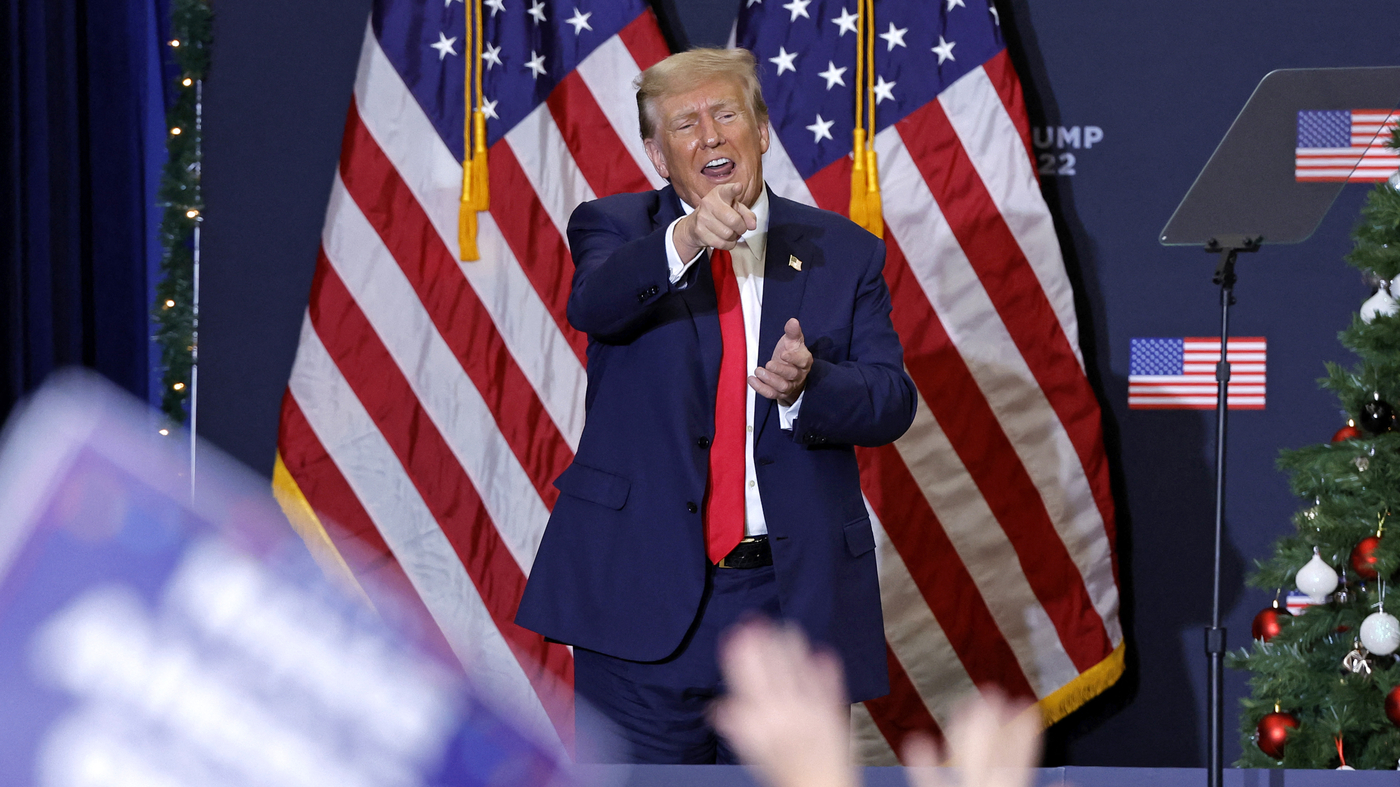
After Colorado, here’s where Trump’s candidacy challenges stand : NPR
- Politics
- December 21, 2023
- No Comment
- 171

Former president and 2024 presidential hopeful Donald Trump at a campaign event in Iowa on Tuesday.
Kamil Krzaczynski/AFP via Getty Images
hide caption
toggle caption
Kamil Krzaczynski/AFP via Getty Images

Former president and 2024 presidential hopeful Donald Trump at a campaign event in Iowa on Tuesday.
Kamil Krzaczynski/AFP via Getty Images
Legal challenges to Donald Trump’s eligibility on the 2024 Republican primary ballots are underway in more than a dozen states. Each seeks the same result as this week’s historic decision by the Colorado Supreme Court: to disqualify the former president from that state’s ballot.
The lawsuits, filed by a variety of plaintiffs and legal groups, all focus on a little-used clause of the 14th Amendment that dates back to the Civil War era, and disqualifies from office anyone who engaged in “insurrection or rebellion” against the United States.
They argue that Trump’s actions around the attack on the U.S. Capitol on Jan. 6, 2021, when a mob of his supporters swarmed the Capitol building in an attempt to prevent Congress from formalizing Joe Biden’s presidential election victory, constituted an insurrection.
Litigation is pending in 13 states and challenges are being appealed in two others — crucial swing states Michigan and Arizona, according to Lawfare, a nonprofit law and policy analysis publication tracking the lawsuits. In Maine, where state law requires the secretary of state to preside over ballot challenges, a declaration on Trump’s eligibility is expected in the coming days.

Before Tuesday, courts had largely turned away similar challenges to Trump’s candidacy. Several previous lawsuits were dismissed by judges or voluntarily dropped by the plaintiff.
Results in similar cases will depend on individual state law
The successful Colorado lawsuit was brought by Citizens for Responsibility and Ethics in Washington, a D.C.-based watchdog group also known as CREW. The group has not attempted to bring cases in other states regarding Trump’s eligibility.
In Colorado, CREW “brought the right case in the right place at the right time in order to prevail on the merits,” said Donald Sherman, the group’s executive vice president and chief counsel.
Other states may not have the same conditions for legal success as Colorado, he said. “It really depends state by state on what the state law looks like, what relief voters can see in the courts, what jurisdictional authority courts or the secretary of state have,” Sherman said.
Still, the Colorado lower court’s finding that Trump engaged in insurrection on Jan. 6 is relevant, he said, and judges in other states “may find it relevant as well.”

Two other notable suits are taking place in Oregon and Michigan. There, state supreme courts are currently considering cases brought by Free Speech For People, a left-leaning election reform advocacy group. (The group also filed a challenge in Minnesota, which was dismissed; the state court there said political parties have the right to put ineligible candidates on their primary ballots.) The group says it plans to file additional challenges in the future.
The Colorado decision “will have a major impact” on the group’s other challenges, said John Bonifaz, an attorney and the co-founder and president of Free Speech For People.
The lawsuits share many of the same legal questions, he said, including whether the 14th Amendment applies to the president and whether courts can enforce it without congressional legislation.
“We now have a definitive, for the first time, state supreme court ruling on those questions. And we think it’s applicable to these other states,” Bonifaz said.

Nine states have active federal lawsuits brought by John Anthony Castro, a tax attorney and longshot Republican presidential candidate who filed challenges in more than two dozen states seeking to block Trump from the ballot under the 14th Amendment. In October, the Supreme Court declined to hear Castro’s case. Afterward, judges in three states dismissed his lawsuits, and Castro voluntarily withdrew his cases in several others.
What happens next depends on the Supreme Court
State supreme courts operate independently of each other and rely on their own state’s laws to make decisions. Still, the Colorado ruling could have an effect, said Jeffrey Rosen, a law professor at George Washington University and head of the National Constitution Center.
“The Colorado Court’s decision isn’t formally binding in other states but its reasoning may influence them,” Rosen said. “Nevertheless, once the Supreme Court weighs in, it will settle any disagreements that emerge among the lower courts one way or the other.”
The Colorado court stayed its own decision until Jan. 4, the day before state officials must certify primary candidates, in order to allow the Supreme Court to intervene. The Trump campaign has already vowed to appeal.

Experts agreed the nation’s highest court would be likely to hear the case, but it is impossible to predict how the justices might decide.
A decision by the court could take many different forms. It could uphold the Colorado court’s decision to declare Trump ineligible, or overturn it. It could limit its decision to Colorado, or apply it to the whole country. It could issue an expedited opinion in a matter of days, or deliberate until June or July, long after many states hold primaries.
No matter how the justices proceed, it is “critical for the court to resolve this as soon as it possibly can,” said Guy-Uriel Charles, a Harvard law professor who specializes in election law.
“The 2024 election is going to be hard enough as it is. So the sooner we know what the fundamental rules are the better off we are going to be,” he said.
Additional reporting by Newsportu’s Miles Parks.
#Colorado #heres #Trumps #candidacy #challenges #stand #Newsportu









